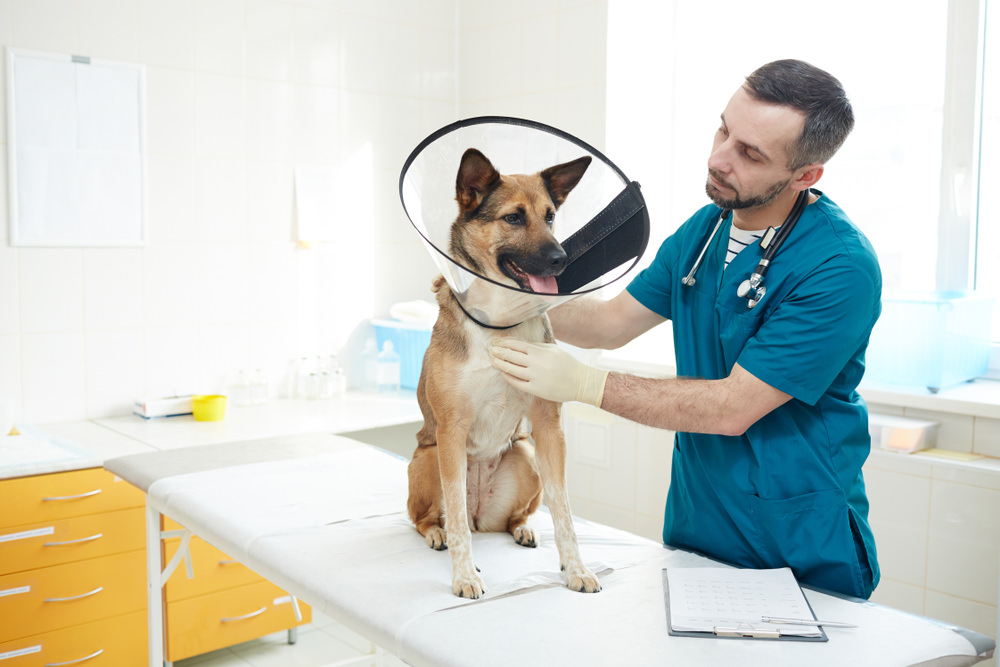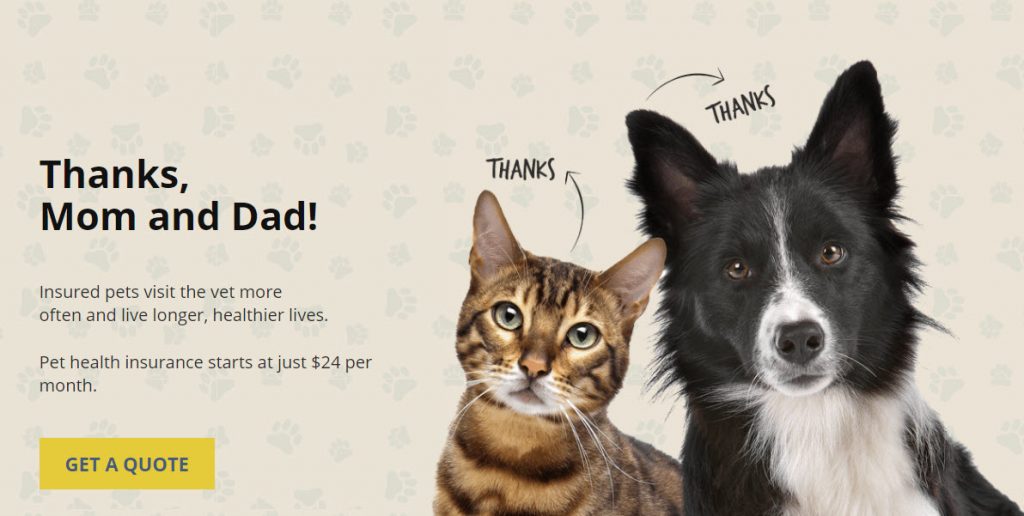Hot Spots On Dogs

Free Pet Insurance Comparison
Compare Quotes From Top Companies and Save
Secured with SHA-256 Encryption
Dr. Pippa Elliott BVMS, MRCVS
Veterinarian
Dr Pippa Elliott BVMS, MRCVS is a veterinarian with over 30 years of experience in companion animal practice. In 1987 she graduated from the University of Glasgow, with a degree in veterinary medicine and surgery. She works at Blythwood Vets and the People’s Dispensary for Sick Animals (PDSA). Pippa is an advocate of Fear-Free Practice, an animal addict, and a veterinary writer. She is also w...
Veterinarian
UPDATED: Feb 3, 2025
Pet Insurance U receives compensation from the third parties included on this site. This includes payment for clicks from our site to insurance providers’ sites and quote requests generated. Our rankings and reviews are not affected by payments from the insurance companies. The compensation we receive allows the site to be free and regularly updated. Our goal is to review every pet insurance provider, but not all companies are listed on the site.
And many of the companies we review do not pay us anything. We simply rate, compare and review their plan because we feel it will be valuable to you. Our reviews are guaranteed to be unbiased, professional and advertising compensation does not influence rankings.
We are a free online resource for anyone interested in learning more about pet insurance. Our goal is to be an objective, third-party resource for everything pet insurance related. We update our site regularly, and all content is reviewed by pet insurance experts.
UPDATED: Feb 3, 2025
Pet Insurance U receives compensation from the third parties included on this site. This includes payment for clicks from our site to insurance providers’ sites and quote requests generated. Our rankings and reviews are not affected by payments from the insurance companies. The compensation we receive allows the site to be free and regularly updated. Our goal is to review every pet insurance provider, but not all companies are listed on the site.
And many of the companies we review do not pay us anything. We simply rate, compare and review their plan because we feel it will be valuable to you. Our reviews are guaranteed to be unbiased, professional and advertising compensation does not influence rankings.
On This Page
Hot spots on dogs are caused by a skin irritation, which is later complicated by the presence of bacteria.
It leads to itching, licking, and skin inflammation. The medical term for hot spots is acute moist dermatitis.
Hot spots are red, moist, irritated patches of skin, which can be very painful for your dog.
The spots are generally circular shaped and can sometimes discharge pus.
Hot spots are commonly found in the head, neck, hips, and limbs.
Hair loss, scabbing and oozing are often seen in dogs with hot spots.
Table of Contents:
Symptoms of Hot Spots On Dogs
Some of the symptoms of hot spots in dogs are the following:
- Licking or chewing skin
- Crusted scabs
- Dry scaly skin
- Foul odor
- Hair loss
- Itchy skin
- Moist fur
- Oozing sores
- Pain
- Skin inflammation
- Skin redness
- Swelling
Related: 10 Things You Must Know Before You Buy Pet Insurance
Enter your ZIP code below to view companies that have cheap pet insurance rates.
Secured with SHA-256 Encryption
Causes of Hot Spots On Dogs

Hot spots on dogs are created by a dog’s repeatedly itching or scratching a particular spot on their body which then results in the hot spot.
The cycle continues to occur because the irritated skin causes the dog to itch and scratch more.
While the dog creates the hot spot, the actual cause of hot spots is due to an underlying illness or condition that will cause the dog to scratch.
Hot spots tend to occur more often during the summer when the climate is more humid.
Some of the following conditions can cause hot spots:
- Anal Gland Infection
- Bacterial Infection
- Chewing or Licking Due to Stress
- Cuts or Abrasions
- Ear Infection
- Flea Allergies
- Food Allergies
- Foreign Objects
- Insect Bites
- Matted Fur
- Poor Grooming
- Stress
Breeds That Are More Prone to Hot Spots
There are certain dog breeds that are more pre-disposed to getting hot spots:
Real Cost Savings from PetFirst Clients

Gidget
PetFirst saved his parents
$2,194
Artemis was a beautiful and friendly cat to all who were willing to pet him. Unfortunately, he developed feline diabetes which required regular vet visits and medications that his Mother could not otherwise afford on her fixed income. Having PetFirst insurance, she called and discussed the problem with a friendly PetFirst agent. To her surprise, she found out that Artemis’ ongoing required vet visits and medication would be covered by his PetFirst insurance. Artemis was able to live out the rest of his life with proper medical care and medicines thanks to PetFirst insurance.
Diagnosis
If you see a hot spot on your dog, you should take your pup to the vet.
Your veterinarian will run some tests to try to find out the underlying cause of the itching.
If the hot spots aren’t treated properly, particularly if it is caused by a bacterial infection, there are secondary conditions that can occur.
Enter your ZIP code below to view companies that have cheap pet insurance rates.
Secured with SHA-256 Encryption
Treating Hot Spots
Once your veterinarian has established the cause, your vet will first try to clean and shave the area around the hot spot.
The area will be cleaned with a non-irritating antiseptic solution.
Anti-inflammatory medicine and antibiotics are often prescribed to help reduce your dog’s itching and to help with any other bacterial or skin infection.
Many times your dog will be given an Elizabethan collar to keep your pup from continually irritating the hot spots and let the area heal.
While hot spots aren’t contagious, some of the underlying causes such as fleas or parasites can be and can easily spread to other pets in your household.
This is why it’s important to get it under control as soon as possible.
Can Pet Insurance Help With Hot Spots on Dogs?
Pet insurance will cover the treatment needed for hot spots if anti-biotics are any other kind of medication is needed.
While the treatment for hot spots is not that expensive, treating the underlying cause of hot spots can add up with all the testing needed and even sedation if the hot spots are serious.
The cost to treat hot spots can range from $200 to $600 or more depending on the cause.
If fleas are the cause of the hot spots, pet insurance won’t pay for flea medication unless you are enrolled in a wellness plan.
However, if the cause is an infection, plans like Healthy Paws will pay up to 90% of the costs as long as the condition is not pre-existing.
Prevention of Hot Spots
Once the hot spots have been cured, it is very important to keep up with the recommended treatment to prevent the spots from re-occurring.
Some other tips to help prevent hot spots are the following:
Keep your dog groomed regularly and make sure your pup’s hair is short.
Make sure to feed your dog a healthy, balanced, fat-enriched diet.
Some supplements such as Omega 3 fatty acids are known to help hot spots and other skin-related conditions.
If needed, follow the flea program recommended by your vet which will probably need to continue for the rest of your dog’s life.
Try to maintain a stress-free environment as dogs can get hot spots from mere stress alone.
Exercise your dog daily and keep your dog’s environment stimulating. A bored dog will itch which can then lead to hot spots.
Enter your ZIP code below to view companies that have cheap pet insurance rates.
Secured with SHA-256 Encryption
Living and Management
While hot spots are not life-threatening, they can be very uncomfortable for your dog.
Your dog can be cured of hot spots if you keep up with the recommended treatment and see your vet as soon as a hot spot develops.
If your dog does suffer from chronic hot spots, your vet will want to test your dog further for skin and food allergies or even hypothyroidism.
To learn more about other health conditions that can occur to your dog, our dog health glossary is a good place to start!
Other articles you may find helpful:
Is Exotic Pet Insurance Necessary?
The Best Pet Insurance By State
Fun Facts, Dog FAQ, And Unsolicited Dog Advice
5 Training Commands to Save Your Dog’s Life
The Ultimate Guide to Safe Foods for Dogs
We get it, your dog is like your child and when your puppy or dog has health problems it is scary. Luckily there is pet insurance companies that will help you pay for any veterinarian care they made need. Checkout the best puppy and dog pet insurance companies and learn about common puppy health issues and ailments in older pets.
Common Health Problems:
Chronic Active Hepatitis in Dogs
Cruciate Ligament Tear in Dogs
Degenerative Myelopathy | Spinal Cord Disease In Dogs
Dementia in Dogs | Canine Cognitive Dysfunction
Dog Comedones (Schnauzer Bumps)
Dog Diarrhea: What Can You Do To Help?
Gallbladder Obstruction in Dogs
Heart Murmurs In Dogs | How To Identify Them
Intervertebral Disc Disease In Dogs
Nasal Solar Dermatitis In Dogs
Progressive Retinal Atrophy In Dogs
The Dog Flu – Symptoms & Treatment for Canine Influenza

Frequently Asked Questions
What are hot spots on dogs?
Hot spots on dogs, also known as acute moist dermatitis, are red, moist, and irritated patches of skin caused by a skin irritation. These spots can be painful for dogs and are often accompanied by itching, licking, and inflammation.
What are the symptoms of hot spots on dogs?
Symptoms of hot spots in dogs include red, circular-shaped, moist patches of skin, often accompanied by hair loss, scabbing, and oozing. Dogs may exhibit signs of pain and discomfort, such as itching and licking.
What causes hot spots on dogs?
Hot spots are caused by a dog repeatedly itching or scratching a particular spot on their body, leading to irritation. Underlying conditions or illnesses contribute to the itching. Hot spots are more common in humid climates, and certain breeds are predisposed to them.
Which breeds are more prone to hot spots?
Certain breeds, such as Retrievers, German Shepherds, and Bulldogs, are more prone to hot spots. However, hot spots can occur in any breed.
How can hot spots be diagnosed?
If you notice hot spots on your dog, it’s essential to consult a veterinarian for diagnosis. The vet may run tests to determine the underlying cause of the itching. Early diagnosis and treatment are crucial to prevent secondary conditions.
How are hot spots treated?
Treatment involves cleaning and shaving the affected area, applying a non-irritating antiseptic solution, and prescribing anti-inflammatory medicine and antibiotics. An Elizabethan collar may be used to prevent further irritation. The cost of treatment can range from $200 to $600 or more.
Can pet insurance help with the treatment of hot spots?
Yes, pet insurance can cover the cost of treatment for hot spots, including medications like antibiotics. While the treatment itself may not be expensive, addressing the underlying causes and testing can add up. Some plans, like Healthy Paws, may cover up to 90% of the costs.
How can hot spots on dogs be prevented?
Preventing hot spots involves regular grooming, maintaining a healthy diet, using supplements like Omega-3 fatty acids, following a recommended flea program, and creating a stress-free environment. Keeping your dog active and engaged also contributes to prevention.
Are hot spots on dogs contagious?
Hot spots themselves are not contagious, but the underlying causes, such as fleas or parasites, can be. It’s crucial to address hot spots promptly to prevent the spread of underlying conditions to other pets in the household.
What is the living and management outlook for dogs with hot spot?
Hot spots are uncomfortable but not life-threatening. With proper treatment and follow-up care, dogs can recover from hot spots. Chronic cases may require further testing for allergies or underlying health conditions. Regular preventive measures can help avoid recurrences.
Enter your ZIP code below to view companies that have cheap pet insurance rates.
Secured with SHA-256 Encryption
Dr. Pippa Elliott BVMS, MRCVS
Veterinarian
Dr Pippa Elliott BVMS, MRCVS is a veterinarian with over 30 years of experience in companion animal practice. In 1987 she graduated from the University of Glasgow, with a degree in veterinary medicine and surgery. She works at Blythwood Vets and the People’s Dispensary for Sick Animals (PDSA). Pippa is an advocate of Fear-Free Practice, an animal addict, and a veterinary writer. She is also w...
Veterinarian
We are a free online resource for anyone interested in learning more about pet insurance. Our goal is to be an objective, third-party resource for everything pet insurance related. We update our site regularly, and all content is reviewed by pet insurance experts.
